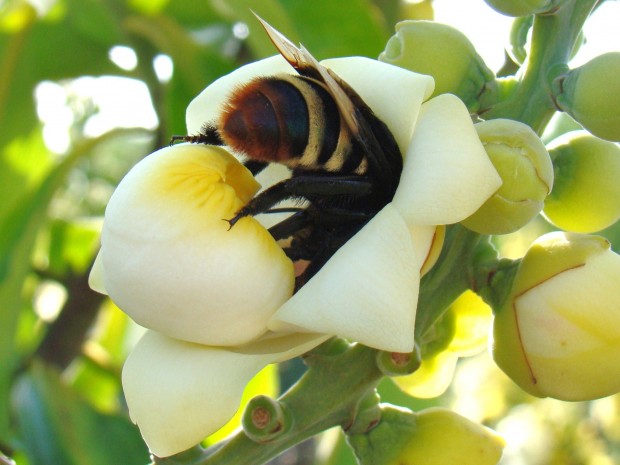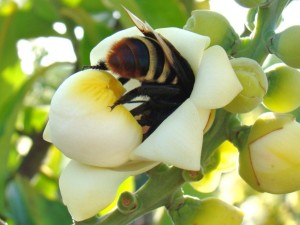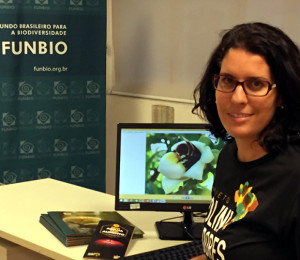
Project alert to importance of pollinators in food production
Project alert to importance of pollinators in food production
Source: http://sna.agr.br/projeto-alerta-para-importancia-de-polinizadores-na-producao-de-alimentos/
Data: 26/05/15

Bee species Eulaema (Eulaema) meriana in Flower Brazil-Brazil. The bee is considered one of the main animals that act directly on pollination 75% the varieties of crops for human consumption. Photo: Marcelo Cavalcante
Worldwide is happening drastically reduce the pollinators - birds, bats, Beetles, butterflies, moths and especially bees -, that act directly on pollination 75% the varieties of crops for human consumption. The phenomenon has been detected in recent years by various research institutions in several countries, together, They have issued this alert. They have also collected measures of the governments of the nations affected by the problem, which has among its main causes indiscriminate use of pesticides and the adoption of monocultures.
In Brazil, It created the project "Pollinators in Brazil", in order to better understand these animals and the importance of pollination in agricultural development. Coordinated by the Ministry of the Environment (MMA), has conducted research and training and awareness activities in the last five years.
The project concentrates its efforts in seven major crops in Brazil - Cotton, cashew, canola, chestnut, Apple, melon and tomato - and is housed in an international initiative of the Food and Agriculture Organization (FAO/ONU), funded by the Global Fund for the Environment (GEF, EnglishGlobal Environmental Facility) and has the Brazilian Biodiversity Fund (Funbio) as the agency responsible for implementation.
Management plans, scientific publications, educational and videos were produced to farmers and also to bee breeders.
According Ceres Belchior, environmental analyst at the Ministry of the Environment, "This project is not an isolated initiative, It was the product of an international mobilization, which began in the late 1990, next to the Convention on Biological Diversity (CDB), of which Brazil is a signatory. This mobilization represented an attempt to understand and combat the decline of pollinators noted in several countries, from a 1970 ".
As a matter of fact, recalls the year 1998, when it was held in São Paulo a workshop, which brought together experts from 15 countries, to study the formulation of a comprehensive program of protection and sustainable use of pollinators. The resulting document of this meeting was called "São Paulo Declaration on Pollinators".
This statement, submitted to CBD, It was approved at the 5th Conference of the Parties to the CBD (COP5), held in Nairobi in 2000, agricultural diversity session. At that time the International Initiative was created for the Sustainable Use and Conservation of Pollinators, also known as "Catcher International Initiative" (IPI).
Once approved the IPI, explica Ceres, the Brazilian government, through MMA, maintained close contact with FAO, assisting in the planning and execution of the project FAO / UNEP / GEF "Conservation and Management of Pollinators for Sustainable Agriculture, through the Ecosystem Approach ".
GOVERNMENT AGENDA
"The initial goal of the Brazilian government was put pollinators on the government agenda and raise funds to support a research network to study its role in various agricultural crops. In 2004 It was created the Brazilian Pollinators Initiative and various actions were carried out ", reports the environmental analyst.
It further clarifies that the "Pollinators of Brazil" project is the nickname in Brazil for the gigantic project name FAO / UNEP / GEF, implemented 2010 a 2015 in seven countries: South Africa, Brazil, India, Desire, Nepal, Pakistan and Kenya.
Approved by the Global Fund for the Environment in June 2008, It started in March 2010, lasting five years and a more than $ budget 20 millions (R$ 62,8 millions) for the global project, from the preparation phase to full implementation, of which US $ 3,5 million was allocated to Brazil.
A organização “Bee or not to be”, which has in its objectives guide the bee and beekeeping as essential activities of the agricultural production chain, It established a partnership with the Pollinators in Brazil to communicate and share these important studies, that not only demonstrate the benefits of pollinators, but advises farmers on management techniques and conservation of pollinators in several crops.
MESSAGE
The environmental analyst MME stresses that "this project has helped to publicize the importance of the role of pollinators in food production and the need to promote the conservation and sustainable use of these animals (birds that can be, bats, non-flying mammals, reptiles, flies, Beetles, butterflies, Butterflies, wasps and, mainly, bees)".
"Before, having discussed 'pollination and pollinators' was restricted to the academic community expert on the subject ", highlights Ceres.
He also points out that "of all the flowering plants (angiosperms) known, 87,5% species depend, at any moment, pollinating animals. Without pollinating many plants do not reproduce nor produce seeds, and the populations that depend on them also decline ".
"Around 75% the food depends directly or indirectly pollinated plants or processed for animal pollination. So, if we do not mobilize to tackle the causes of the decline of pollinators, our food and nutrition security will be compromised. "

Project coordinator "Pollinators in Brazil," the Brazilian Biodiversity Fund (Funbio), Vanina Antunes, points out that this is the biggest initiative ever made in Brazil on the relationship between pollination and food production. Photo: Funbio file
GOOD HABITS
Pollinators Project Coordinator of Brazil in the Brazilian Biodiversity Fund (Funbio), Vanina Antunes points out that "this is the biggest initiative ever made in Brazil on the relationship between pollination and food production".
"Studies show that pollinator species are present and have role in pollination seven economically important crops in Brazil (cotton, cashew, canola, Brazil-Brazil, Apple, melon and tomato) and objectively indicate the pollination benefits for producers: higher productivity and quality, that provide higher income ", Vanina highlights.
"From the work were also systematized and made available, na internet, lists of good practices to enhance the presence and action of pollinators. The results represent a valuable knowledge, which can be accessed by producers from all regions ", reports the representative of Funbio.
By SNA / SP team
Learn more about Pollinators Project Brazil

Sorry, the comment form is closed at this time.